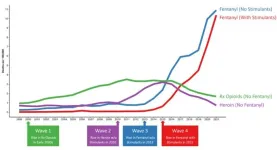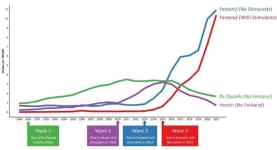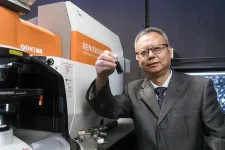New foresight report identifies urgent policy actions needed to put SDGs back on track
Ahead of the UN’s SDG Summit (18-19 September), ground-breaking analyses shows how by enacting five ‘extraordinary turnarounds’ SDGs implementation can be accelerated
2023-09-14
(Press-News.org) Ahead of the UN’s SDG Summit (18-19 September), Earth4All, an international team of economists and scientists, and the Foundation for European Progressive Studies (FEPS), unveil groundbreaking research showing that policymakers can ensure the implementation of SDGs by 2050. The report ‘SDGs for All: Strategic scenarios’ equips policymakers with practical solutions designed to accelerate SDG implementation and to respond to the planetary emergency. It concludes that policymakers can step up the implementation of the SDGs by 2030 and beyond and achieve wellbeing for all. But this is only possible by enacting five ‘extraordinary turnarounds’ that break with current trends.
UN Secretary-General António Guterres has urged world leaders to come to the Summit “not with beautiful speeches, but with concrete actions, plans and commitments to accelerate the implementation of the 2030 Agenda and the Paris Agreement on Climate Change”.
The report responds to the UN Secretary-General’s call for more rigorous strategic analysis and foresight to support policymaking. It brings together analysis from leading scientists, economists and modelers, offering proven ways to implement the SDGs and dramatically improve the course of policymaking at major upcoming global meetings, including the UN SDG Summit, the UNFCCC COP28 and the UN Summit of the Future.
The ‘SDGs for All’ report is built around the future scenarios and the five extraordinary turnarounds first explored in Earth for All: A Survival Guide for Humanity, published in 2022. The two scenarios are:
‘Too Little Too Late’ (TLTL) – a decision-making as usual approach resulting in deepening wealth inequality, growing social tensions and limited efforts to address climate and ecological risks. As a result, global temperature increases to 2.5°C by 2100 putting the stability of the earth system at risk. Wellbeing continues to dramatically decline globally, and it takes until 2100 to eradicate extreme poverty.
‘The Giant Leap' (GL) – an alternative, achievable path costing 2-4% GDP per annum empowers society to make ambitious decisions by implementing five extraordinary turnarounds simultaneously across poverty, inequality, empowerment, food and energy. As a result, temperatures would stabilise below 2°C, material consumption is reduced, extreme poverty is eradicated by 2050, social tensions fall dramatically, inequality is reduced, and wellbeing rises exponentially. If policymakers around the world embrace this ‘Giant Leap’, huge improvements for people and planet are possible.
“The Giant Leap scenario offers a way out of the current planetary emergency and a pathway for attaining the majority of SDGs by 2050. However, this will require a radical transformation away from today’s extractive economy dominated by GDP growth to wellbeing economies that place a value on people, planet and prosperity”, comments Sandrine Dixson-Declève, co-president of The Club of Rome, co-author of Earth for All and co-lead of the Earth4All initiative.
The report models how progress towards achieving the SDGs would be in both scenarios.
Poverty – In Too Little Too Late 20% of the global population live in poverty by 2050 – compared to 7% in the Giant Leap.
Inequality – income gender parity is achieved in the Giant Leap, but severely worsens under Too Little Too Late with owners accounting for 75% of incomes.
Emissions - CO2 emissions reach net zero under the Giant Leap in the 2040s. Compared to 2 Tonnes of CO2 per person in the Too Little Too Late scenario by 2050 – which would in result in 17 billion tonnes of carbon emitted globally per year.
Public spending – An additional $8.8 trillion is spent globally on public services per year by 2050 in the Giant Leap - equivalent to $6,000 per person per year. Whereas the spending is $4,800 per person per year in Too Little Too Late in 2050.
A key red flag in the report is that by 2050, the level of global warming is too high in both scenarios, with devastating consequences in every corner of the globe. However, global warming eventually plateaus below 2°C under the Giant Leap and gives a chance for humanity to thrive again. The reality of overshooting above 1.5°C in both scenarios gives serious cause for concern regarding the lack of planetary emergency plans currently in place to address climate change and the resulting increase in shocks and stresses.
The modelling has also shown that gender equality is woefully off track; at current rates it would take 257 years to reduce the overall gender gap.
“This must serve as a wake-up call for society”, said Maria João Rodrigues, President of the Foundation for European Progressive Studies. She continued: “The upcoming UN SDG Summit will mark the half-way point to the 2030 deadline for achieving the SDGs, and that is why we asked Earth4All to analyse the progress made and what we need to do to get back on track with their unique system dynamics model. Action can no longer be avoided, it must be done in a systemic way and adopted on both international and national levels.”
Sandrine Dixson-Declève, co-president of The Club of Rome, co-author of Earth for All and co-lead of the Earth4All initiative, concluded: “Our economic and financial systems are broken and we are reaching dangerous levels of inequality. The Too Little Too Late scenario when applied to the SDG’s condemns future generations to a dangerously destabilised planet. The climate system is likely to cross multiple tipping points and social tensions are likely to increase. This must be avoided at all costs. By contrast our Giant Leap scenario significantly reduces this risk, thereby contributing to greater resilience and the possible emergence from emergency.
“Although the achievement of the SDGs especially SDG13 and SDG5 is in grave danger, failing to meet them is not an option. The recipe for success: SDG implementation must be coupled with emergency planning to prepare for future shocks and stresses and leaders must take up the call for radical transformation.”
To achieve the pace and scale of change required for meaningful SDG progress by 2050, the report identifies several urgent policy levers which need to be implemented simultaneously:
Significant new investments are essential – they must be accompanied by massive increases in public spending, along with higher taxation of extremely wealthy individuals and private corporations.
Fundamental reform of the International Monetary Fund’s process for allocating Special Drawing Rights (SDRs) – to support countries that need them most. And dealing with the sovereign debt overhang is also essential to give low-income countries more fiscal space and relief.
Governments must quickly reverse the steady erosion of workers’ rights and implement new safety nets such as a universal basic dividend.
Governments must massively scale up investment in women and girls to reverse the huge declines in terms of income, safety, education and health.
Global food systems must be radically transformed, starting with the repurposing of agricultural subsidies towards supporting low-carbon and regenerative agriculture practices to improve food production efficiency and sustainability. Food supply chains must shift towards localised food production, and farmworker rights must be prioritised and protected.
Global energy systems must shift from inefficient fossil energy systems to a clean and optimised energy system that reduces consumption in high-income countries, ensures electricity access to all, and enhances greater efficiencies across the global energy system.
Earth4All and FEPS will present the findings of the SDGs for All report to the UN and stakeholders prior to and during the SDG Summit.
END
ELSE PRESS RELEASES FROM THIS DATE:
2023-09-14
New research published in the scientific journal Addiction has found that the proportion of US overdose deaths involving both fentanyl and stimulants has increased more than 50-fold since 2010, from 0.6% (235 deaths) in 2010 to 32.3% (34,429 deaths) in 2021. By 2021, stimulants (such as cocaine and methamphetamine) had become the most common drug class found in fentanyl-involved overdoses in every US state. This rise in fentanyl/stimulant fatalities constitutes the ‘fourth wave’ in the US’s ...
2023-09-14
New UCLA-led research has found that the proportion of US overdose deaths involving both fentanyl and stimulants has increased more than 50-fold since 2010, from 0.6% (235 deaths) in 2010 to 32.3% (34,429 deaths) in 2021.
By 2021, stimulants such as cocaine and methamphetamine had become the most common drug class found in fentanyl-involved overdoses in every US state. This rise in fentanyl/stimulant fatalities constitutes the ‘fourth wave’ in the US’s long-running opioid overdose crisis –the death toll of which continues to rise precipitously.
“We’re now seeing ...
2023-09-14
Most students who complete manufacturing-related credentials in Ohio do not end up employed in manufacturing in the state, highlighting a challenge that faces policymakers as they push to create more U.S. manufacturing jobs, according to a new RAND Corporation report.
Among those who earned a manufacturing-related credential from a public postsecondary institute in Ohio from 2006 to 2019, fewer than 40% worked in manufacturing in the state within one year after completing their education.
Wages are not a likely contributor to the trend. Students who enter other fields after completing a manufacturing-related credential earn less than their peers who pursued ...
2023-09-14
A research team led by City University of Hong Kong (CityU) has achieved a groundbreaking advancement in nanomaterials by successfully developing a highly efficient electrocatalyst which can enhance the generation of hydrogen significantly through electrochemical water splitting.
This major breakthrough has great application potential for the clean energy industry.
Professor Zhang Hua, Herman Hu Chair Professor of Nanomaterials at CityU, and his team have developed an electrocatalyst by using the transition-metal dichalcogenide (TMD) nanosheets with unconventional crystal phases as supports. The electrocatalyst exhibits superior activity and excellent ...
2023-09-14
Three quarters of trusts in England that responded to a survey by The BMJ are still reliant on paper patient notes and drug charts, despite progress towards electronic records and prescribing.
The results came in just as an expert panel convened by a House of Commons committee concluded that the UK government had failed to meet a key target to eliminate paper prescribing in hospitals and to introduce digital or electronic prescribing across the entire NHS by 2024.
Jo Best, freelance journalist and doctor, ...
2023-09-14
The UK National Clean Maritime Research Hub (UK-MaRes Hub) aims to accelerate the decarbonisation and elimination of air pollution from maritime activity in ports and at sea.
As well as environmental impacts, the Hub will also focus on the potential economic and social benefits of transitioning to a clean maritime future.
The UK-MaRes Hub was announced today (Thursday 14 September) by the UK Government’s Maritime Minister, Baroness Vere of Norbiton, during London International Shipping Week. She was joined by the Director of the UK-MaRes Hub, Professor Tony Roskilly, Chair of Energy Systems in the Department of Engineering at Durham University.
The Hub will carry out ...
2023-09-13
EMBARGOED FOR RELEASE UNTIL 4 P.M. ET, WEDNESDAY, SETEMBER 13, 2023
MINNEAPOLIS – Nearly one in five people on Medicare travel 50 or more miles one way to see a neurologist, a doctor who diagnoses and treats diseases of the brain and nervous system, according to research published in the September 13, 2023, online issue of Neurology®, the medical journal of the American Academy of Neurology (AAN). The study, funded by the American Academy of Neurology, found that people who require specialized neurologic care for diseases such as brain cancer, amyotrophic lateral sclerosis (ALS) and multiple sclerosis (MS) ...
2023-09-13
In a trio of papers appearing in Nature on Sept. 13, 2023, the researchers offer the most comprehensive look yet at how malnutrition affects growth in the first two years of life, underscoring a devastating reality for millions of children in the Global South, particularly Asia.
In 2022, more than one in five children around the world – nearly 150 million – did not get enough calories to grow normally, and more than 45 million showed signs of wasting, or weighing too little for their height. More than a million children die each year as a consequence of wasting and more than 250,000 die from stunting. People who experienced ...
2023-09-13
ITHACA, N.Y. -- Robust navigation is both critical for survival and dauntingly complex: Think of the speed and agility of an airborne fly.
A multidisciplinary team of researchers led by Itai Cohen, professor of physics in the College of Arts and Sciences, will use the fruit fly, Drosophila melanogaster, to study how the brain forms a coherent representation from multisensory information, corrects for errors from perturbations and generates robust behaviors.
The project, supported by a $6.5 million grant from the NIH Institute of Neurological Disorders and Stroke, has potential for insight into human neurological function.
“We are gearing up to understand how ...
2023-09-13
ITHACA, N.Y. – Ecologists have demonstrated that the genetic material that species shed into their environments can reveal not only the presence of the species but also a broad range of information about the genetics of whole populations — information that can help scientists trace the source of a new invasive population as well as prevent further invasion.
The advancement in environmental DNA (eDNA) also opens new possibilities for protecting endangered and vulnerable species.
“For the benefit of biodiversity conservation, we’re ...
LAST 30 PRESS RELEASES:
[Press-News.org] New foresight report identifies urgent policy actions needed to put SDGs back on track
Ahead of the UN’s SDG Summit (18-19 September), ground-breaking analyses shows how by enacting five ‘extraordinary turnarounds’ SDGs implementation can be accelerated


